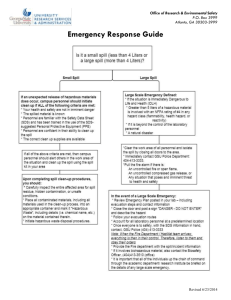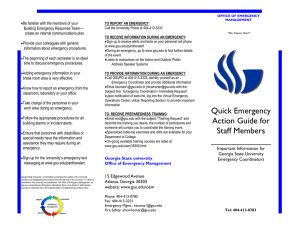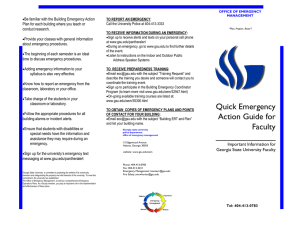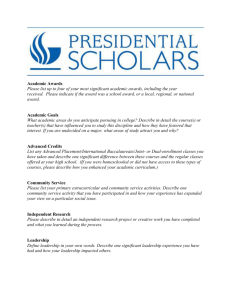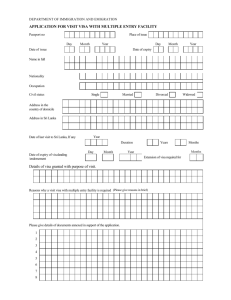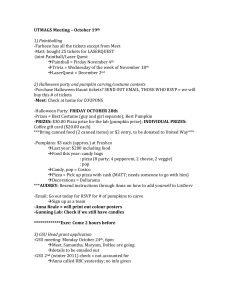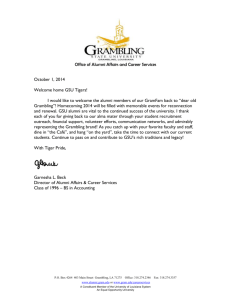atlantis students manual an atlantis handbook
advertisement
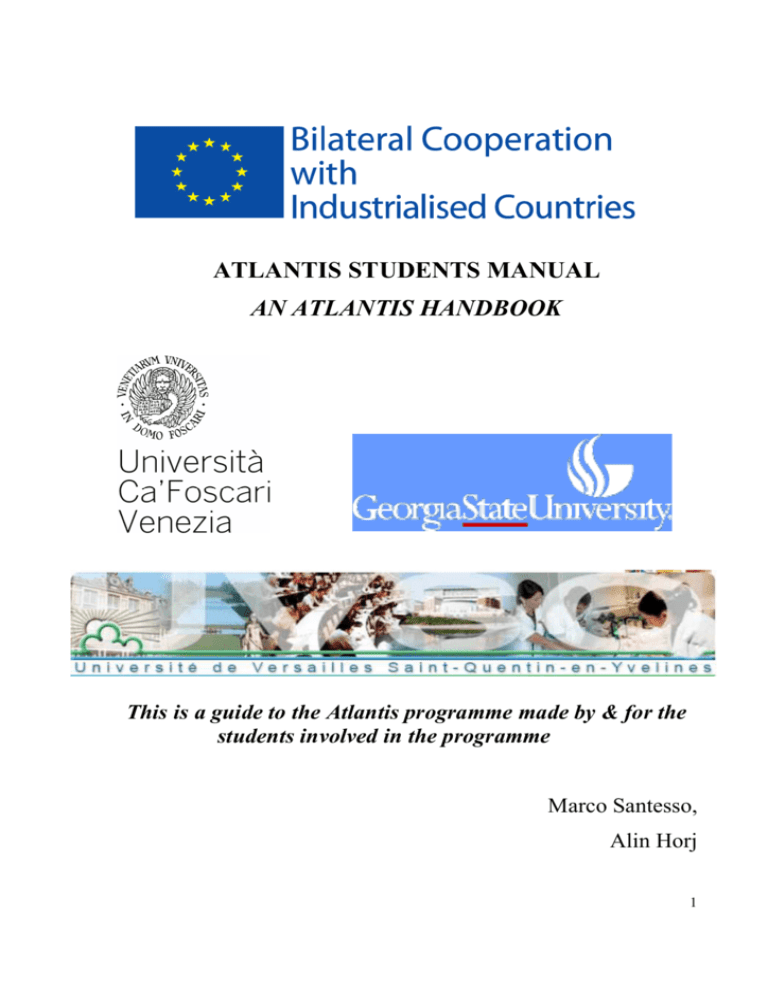
ATLANTIS STUDENTS MANUAL AN ATLANTIS HANDBOOK This is a guide to the Atlantis programme made by & for the students involved in the programme Marco Santesso, Alin Horj 1 INTRODUCTION The ATLANTIS programme is a higher education and vocational training cooperation programme between the European Union and the United States established in 1995 and jointly funded by European Commission and the U.S. Department of Education. It aims at promoting understanding and at improving the quality of human resource development from the two continents. To achieve these objectives the programme supports several actions, such as the Transatlantic Degree action, Excellence Mobility Projects, Policy-oriented measures, and the Schuman-Fulbright action. By participating in the ATLANTIS programme, students have the opportunity to be immersed in very diverse networks of places, meet new people and acquire skills which will enable them to cope in a more confident way with the challenges of the future. This handbook intends to offer a valuable insight into the program, ranging from administrative issues, deadlines, schedules, to some general useful advices. Before jumping into the details let’s have an overview. OVERVIEW THE ATLANTIS PROGRAM AT CA’ FOSCARI The ATLANTIS “Dual Degree” Program consists of getting 2 degrees in four years simply by additionally studying at Georgia State University (GSU) in Atlanta for a year, and at Université de Versailles Saint-Quentin-en-Yvelines (UVSQ), in France, for a semester, within the Erasmus mobility framework. Being among 9 other selected projects in 2008, the double degree programme received a €420,000 ATLANTIS grant by the Fund for the Improvement of Postsecondary Education (FIPSE), and the European Commission's Directorate General for Education and Culture. 2 Some figures and statistics With its more than 30.000 students, GSU is the second largest university in the State of Georgia, with almost $460 million of revenues per year. It is the Southeast’s leading urban research institution, and it is listed in the top 100 Public Universities for doctoral degrees awarded in more than 250 fields of study. Its public policy school, the Andrew Young School of Policy Studies ranks 27th among the top policy schools in the US. The UVSQ, with more than 140 cooperative educational and exchange agreements supporting the research projects which are led by its laboratory network teams, is present on the five continents. The University is active in a wide spectrum of fields and it is also an active contributor to the European higher education and research community, coordinating or taking part in numerous European research projects. WHY SHOULD A STUDENT INVEST ON THE ATLANTIS PROGRAM? 1. With an additional one year at GSU and one semester at UVSQ, which will not prevent you from collecting the bonus credit for speed since for this particular program the total duration is 4 years, students will receive two degrees, one from Ca’ Foscari and one from GSU. 2. Depending on preferences, needs and suitability, an ATLANTIS student can choose one GSU degree among the following: - Bachelor of Arts in International Economics and Foreign Languages. - Bachelor of Science in Economics. - Bachelor of Arts in Economics. 3. The undergraduate degree in a US university will permit to be exempted from the TOEFL or similar English requirements when applying for masters abroad (for example the Barcelona Graduate school of economics, London School of Economics, University College London, University of Geneva,…). However some Universities require the TOEFL anyway for some programs (University of Amsterdam, some American Universities,…). 4. It is an excellent opportunity to gain an invaluable international experience during your stay abroad. You will live in a cosmopolitan environment, have access to outstanding infrastructures (e.g. gyms, libraries, classrooms, updated labs) and learn from a hard-working and knowledgeable staff. Finally, you have access to various extracurricular activities and conferences organized by GSU, but also different events organized by numerous European Chambers of Commerce in Atlanta, which can offer 3 you a priceless networking opportunity. Needless to say it is mind opening towards new cultures, ways of teaching and ideas. FEW SPECIAL RULES There are some special rules for the participants in this program. The Academic Senate Resolution has decreed that the duration of Programme will be 4 years instead of 3; the points of “Bonus di Velocità” will be calculated on the length of 4 years and the reduction of the tuition fees consequently. However, students don’t have bonuses for exams taken abroad and are not exempted from the internship requirement of Economics and Management. Lastly, the credits exceeding the 180 threshold are recognized in the certification of the Academic Title, so all the GSU and UVSQ exams will be reported also in the Ca’Foscari transcripts. APPLICATION [This wonderful experience won’t start unless you follow the application information, so here they are.] PRELIMINARY STEPS & NECESSARY STEPS To apply, a student must be enrolled in the 2nd year of Economics and Management, and must have gained at least 60 credits before the deadline for the application, 90credits by April, and 120 credits by the end of the summer exams session. Moreover, it is required a C1 proficiency level both in Italian and English language. The English requirement has to be fulfilled before the arrival at GSU. The candidates will have to download the application form online and bring it to the “Presidenza della Facoltà di Economia - Campus di S.Giobbe – Cannaregio 873 – Venezia” personally unless he/she delegate someone else and gives him/her a copy of an official ID, around the end of January (the precise date changes year by year). The candidates whose application forms are late, incomplete, not written on the right application form, or false will be automatically excluded. In February there will be the first selection and ranking. Between the end of February and March there will be the interview for the students, and the final ranking. 4 The first selection is based on the arithmetic average of the grades, where every laude accounts for a 0.5 more. In the case of a tie, it is given privilege to the students with most credits and to the youngest. The interview will be in English and it will be presided by UCF faculty and by one or more GSU professors. The student has to present also a motivation letter in English. This is a very important step in the interview process, as it shows the student’s motivation in taking part in this challenging but rewarding experience. If the student is abroad for important reasons the interview can be done also with SKYPE. The final ranking is based on the following criteria: - 50% on the arithmetic average of the grades (given more weight to more credits) - 50% on the interview (the student will receive a grade during the interview as if it was an exam …/30) The final ranking will be posted at “http://www.unive.it/nqcontent.cfm?a_id=49504” in March. The selected students will be a maximum of 11. All of the students will have the tuition costs at GSU waived and the call for application will specify the number of scholarships available (each amounting to 12.000 Euros taxes excluded). To receive these scholarships the students will have to undersign a document stating they will accomplish the program requirements successfully. The grant will be divided into tranches and given to the students throughout the year. Tip from past students: [As you will receive the last tranche of the scholarship after coming back from Atlanta, it is advisable not to rely solely on the scholarship. Instead, secure some financial resources beforehand. Your visa allows you to work legally only on campus for maximum of 20 hours weekly and sometimes it can be hard to manage school and work. However, some of us have worked as student and research assistants. Keep in mind that you are not allowed to receive any kind of remuneration or work legally off-campus. You can only volunteer or do an unpaid internship for example.] 5 THE DEPARTURE PROCESS FOR THE USA [Now, let’s have a look at the leaving process (visa, exams to be taken in Italy, insurance, vaccines, housing, what to put in your bag)] The departure process is pretty lengthy so make sure you start working on it as soon as you know you have been selected for the Atlantis program. You will have to get a F-1 visa, buy your plane ticket, find a house, and decide what to bring with you. VISA The F-1 Visa can be obtained in Naples, Florence and Milan. The consulate in Rome will be closed until the middle of March 2012. However, the way to apply and the documents required for the visa are the same in each consulate. Here are the links for the US embassy in Italy which you have to explore in order to understand how to get your visa F-1. However I am going to summarize some important steps. If you go to these links you can find, at the bottom of the page the requirements for the passport (machine-readable). http://italy.usembassy.gov/visa.html http://italian.italy.usembassy.gov/visti.html Here you will find all the information regarding your type of visa. http://italy.usembassy.gov/visa/vis/vis-4-en.html http://italian.italy.usembassy.gov/visti/vis/vis-4-it.html The first thing you will receive is the Form I-20A-B, "Certificate of Eligibility for Nonimmigrant (F-1) Student Status for Academic and Language Students". You will receive this only after you send your TOEFL to GSU. It has to be properly completed and signed. In order to complete it you need to present documentary evidence that sufficient funds are, or will be available from a specifically identified and reliable financial source to defray all living and school expenses during the entire period of anticipated study in the United States. Specifically, the applicant must present credible documentary evidence that he or she has enough readily available funds for each subsequent year of study. The Atlantis grant will be sufficient to pass this requirement, however the amount that they are requiring IS around $1000 per month. Some examples of certifications are: Letter from bank attesting that the person (or a parent who will also attest to be the sponsor) has the economic means to finance the amount indicated on the I-20 Form, a bank statement declaring that the person has at least the amount indicated on the I-20 Form, a customs declaration from the sponsoring organization. 6 You will then have to fill out the DS-160. You should study this link: http://italy.usembassy.gov/visa/forms.html and then start the application here: https://ceac.state.gov/genniv/. The documents required before filling the DS-160 are: SEVIS number (in the up-right of the I-20); passport (number, place and date of issue, termination date); identity card number; date of arrival in the USA; type of Visa (F-1); address and phone number of the school; address of the place you plan to live in (it is ok to write “campus residence hall”: you can provide the GSU address from the I-20 form. This should normally be 33 Gilmer Street); dates of previous trip in the USA; name, address and phone number of Ca’ Foscari; the schools and the dates from the elementary schools to university; names, addresses and phone numbers of two people in Italy(family’s friends) that could count as referents. In Italy, the PASSPORT BOOK NUMBER and the SOCIAL SECURITY NUMBER do not exist, so just click “Does not apply”. The “National Identification Number” is the number of your Identity Card (Carta d’Identità). You will also need one passport size photo (here you will find the necessary information about the requirements of the picture: http://travel.state.gov/visa/visaphotoreq/visaphotoreq_5334.html#nonimmigrant). IMPORTANT: Remember that you need to FILL OUT THIS FORM AND PRINT IT because you need to bring the confirmation page at the interview. It is better to send a copy by email to yourself so you can have it everywhere. (Student’s tip: the website of the DS-160 is prone to crashes so make sure you save often.) To make an appointment with the consulate you can go this website http://www.usvisainfo.com/it-IT/selfservice/ss_country_welcome and it will cost you 10 Euros, or you can call and it will cost you 15 Euros. (Student’s tip: despite the price, calling is more effective and you can ask for more flexible dates). The Visa Information Service is operative from 8:30 to 17:00, from Monday to Friday, not during Italian festivities. The number for calling from Italy is 199 44 23 99; from everywhere is +39(06)9936-6531. The wait could be as short as one week or as long as more than one month, so start doing the whole process early on. The operator will ask you the confirmation number of the DS-160, the number and the termination date of your passport, the SEVIS number, the consulate of your choice. You will have to pay the SEVIS fee of $200 at least three days prior to the interview. More info about the SEVIS is available here: http://www.ice.gov/sevis/i901/ ; to pay go here https://www.fmjfee.com/i901fee/ and read carefully the instructions; for example, keep in mind that you have to have a working printer when you fill the form online. You will also have to pay to Banca Nazionale del Lavoro (the bank of the American consulate in Italy) $130 for the appointment. 7 When the day of your interview arrives, bring with you: the confirmation page of the DS-160, a valid passport, I-20 completed, the bank statement (or the proof of the grant), the receipt from BNL, the SEVIS confirmation page, one passport-size picture (with all the requirements), a letter given by Ca’ Foscari stating that you need to come back in order to graduate. Here you will find the addresses of the Mail Boxes, Etc. (MBE) where you have to go in order to retrieve your visa: http://italy.usembassy.gov/visa/procedures.html. With this visa you cannot accept off-campus employment during your first year in the USA; you can, however, accept on-campus employment from the school. http://www.studi-internazionali.it/file_download/visto/Visto_f1.pdf ] Bags and plane ticket As you will be starting to fly planes more often, make sure you create a frequent flyer account with the airline you fly and start earning miles. In this way, you can earn more miles which can give you a free flight after some trips and other advantages. It is not necessary that the earlier you buy your ticket the cheaper it will be. Just try to look at more companies and compare the prices. You can fly British Airways, or Delta Airlines. However, prices for a round trip usually range from $650 to more than $1000. Regarding your bags, you can usually take: -a max 23 kg bag -a carry on (unlimited weight) –check out the dimensions. -a computer case (this depends for each airlines, so read their policies). In Atlanta the climate is hot (during the long summer the temperature is 30 Celsius circa), and the winter does not last long. You should bring clothes for both seasons; however clothes are very cheap in the USA (especially in retail chains such as Wall Mart, Ross, Target). 8 Medical Requirements You are required to have Insurance, not before departure but during the first weeks. It does not matter if you provide for it or you pay the school for it. You can find some information here: http://www2.gsu.edu/~wwwdos/healthinsurance.html It costs $500 circa per semester. You are also required certain vaccines, here you will find which: http://www.usg.edu/student_affairs/documents/2010_ImmReqs.pdf There are some exemptions (religion, personal believes, other problems,…); here you can find all the information http://www.gsu.edu/health/immunizations_and_travel.html Keep in mind that the vaccines are pretty expensive in the USA, so if you do not meet the requirements it is better to have them done in Italy. Housing You will receive some brochures with some offers regarding housing. Possible locations are: - The commons on campus (http://www.gsu.edu/housing/University_Commons.html) - The lofts (http://www.gsu.edu/housing/The_Lofts.html) which are on campus (downtown Atlanta), - 100 Midtown (http://100midtown.com/) which is off campus (20 minutes from the university with the Metro). -Another interesting location is Art Center Tower Apartments (http://www.apartments.com/rent/Atlanta-GA/Arts-Center-Tower/102142.98). -Lastly, great location and reasonable price: http://www.cityplazajmg.com/ -You can also check on Craiglist but as from personal experience it is advised to pay some attention. Make sure you spend some time in searching the right house for you; one year is pretty long so you want to live in a familiar place. Tip from past students: [in the USA in many buildings windows do not open, in Art Center they do, so if you want an apartment where windows open you have to look for it.] 9 There is another option: a group of friends could rent a house for the year. The prices for renting are very low, lower than any other option. Once signed a contract, it is very expensive to end it so please be careful with your choice. THE RETURN FROM THE USA In order to have your transcripts transferred from GSU to Ca’ Foscari there are just few steps. You will receive around September few contact-emails by the ATLANTIS Tutor & Advisor dr. Carlo Damiani (cdamiani1970@gmail.com) who will ask you to bring/send an Official Transcript at his office. To obtain the Official Transcript log into GoSolar, select Student Records Menu and then request printed/official transcript. The first 5 will be free of charge. The website will ask you which type of Transcript you need. The type does not matter, although the “External/ Official for Mailing” is probably better. Keep in mind that they will take some time to arrive from Atlanta. Once dr. Damiani has received the Official Transcript, and he has given it to the management department to Mrs. Chicca Morena, you have to make an appointment with her (giada@unive.it) to discuss regarding your study plan ("piano di studi"). It could be a lengthy process before you can eventually see booklet on unive.it updated with all the exams but Mrs. Chicca Morena is really helpful. If you have not done the mandatory stage yet, at this point you can talk to Damiani, Morena and also to Prof. Anna Comacchio (comacchio@unive.it) or consult with the ATLANTIS Coordinator Prof. Ugo Rigoni (rigons@unive.it) for advice. While you are doing this you also have to follow the bureaucracy process related to the Erasmus period in Saint-Quentin-en-Yvelines. THE DEPARTURE PROCESS FOR FRANCE To go to France, which is mandatory, you also need to do some paper work. You can decide whether you want to go during the first semester or the second semester, however the paper work is the same, only the timing will be different. Tip from past students: [ all of the French courses have a program which is divided in the 2 semester so if you go in the second one you will be in a class where the program has already started so it could be more difficult.] Paper work You need to apply for the Erasmus mobility period (fare domanda), and you should do this while still in the USA (you will receive an email as a reminder in April). After this you have to fill an Application form in the UVSQ website for the enrolment and you will receive a letter of admission few days later at your home address. 10 You will then have to do the Learning agreement stating which courses you are intentioned to take at UVSQ. At this point you do not know the courses that you will take there because in your first week at UVSQ, you will have to take a test that will state which is your level in French. Nonetheless, you will have to achieve 15 credits during your stay (each class is worth in general 3 credits; however you have to check this once you are in UVSQ). With the French language classes that you can take, which are 3, you can obtain a maximum of 9 credits. You can choose the other 2 based on which requirements you still have to meet at GSU. Remember that the learning agreement can be changed in the first 30 days you are at UVSQ. For the French language courses just pick 3 and later you will change them to what you are really taking. Student’s tip:[ to check what is needed for completing the bachelor at GSU go to gsu.edu, log in into Gosolar, click Student records menu, View Academic Evaluation, select the latest term and finally Academic evaluation. To see which courses are offered at UVSQ, once you are in the UVSQ website select “portail etudiant” at the top of the page,” vos etudes”,” Emplois du temps”,” UFR Sciences sociales, UFR Sciences de la santé, IEC, ISM ILEI et OVSQ”, “Groupes” and here you have the groups for all the subjects. Regarding the French language courses in particular DUEFI is the group for the people with the lowest level of French and DUEFIL-TD3 is the one for the students with the highest level.] Once the learning agreement is signed by your coordinator you have to make an appointment with the International Relations Office (Ufficio Relazioni Internazionali) to have them sign the Learning agreement and fill out the Financial contract in which you will say how you want to receive the Erasmus grant. You can do this only within 10 days from your departure unless there are important reasons. Once you are in this office they should give you (otherwise you should ask them) a blue hand book, which you can also download from the web, titled “Vademecum dello studente Erasmus. Procedure e Modulistica.” In this hand book, between other documents, there are the form for the changes to the Learning agreement, the confirmation of arrival and the confirmation of departure. The “Changes to the learning agreement” once completely filled out before the deadline has to be faxed at Ca’ Foscari (the fax number appear in the form). You have to bring the “Confirmation of arrival” at the appropriate office at UVSQ Student’s tip:[ UVSQ staff will tell you which one it is during the presentation day] in order to receive the Erasmus grant. The same office will have to sign your “Confirmation of departure” which you will bring with you since you will have to give it to the International Relation Office in Venice within 15 days of your return. Together with the Confirmation of Departure you will have to bring to the office also the Confirmation of Arrival; the Learning agreement with the changes; the questionnaire related to the Erasmus period which will be sent to you at the university email or can be requested at erasmusout@unive.it; the Transcript of records if already released. 11 Once you have presented these documents to the International Relations Office, they will give you a copy of the documentation which you will have to bring to your coordinator in order to have your exams recognized. The grades will be subsequently transferred to GSU. To contact the International Relations Office at Ca’ Foscari: Ca’ Foscari, Dorsoduro 3246, 30123 Venezia Tel.: +39 041 234 7570 / 7575 Fax: +39 041 234 7567 E-mail: erasmusout@unive.it To contact the International Relations Office at UVSQ: Bâtiment d'Alembert 5/7 boulevard d'Alembert 78047 Guyancourt Cedex Tel. : + 33 (0)1 39 25 58 21 Fax : + 33 (0)1 39 25 51 35 HYPERLINK "mailto:relations.internationales@admin.uvsq.fr" relations.internationales@admin.uvsq.fr All of the info regarding the Erasmus procedures can be found at: http://www.unive.it/nqcontent.cfm?a_id=26458. Travelling to Saint Quentin and other important Infos To reach Saint Quentin you can choose between the train, the plane and the car. If you take the train, buy the ticket in advance (one month early) since sometimes there are very good offers at that time. The same thing is valid for the plane, sooner you buy your ticket cheaper it is. If you decide for the car, it is a long drive and although it will permit you to move more freely around Saint Quentin and wherever you want to go, it will prevent you to look for a house in Paris since there are not many parking spot and they are quite expensive. However, the school parking costs €18 for the whole year. If you travel by car remember that the highways in France cost as much as Italian ones and you have to pay for the Mont Blanche tunnel €38 and as much for the highways in Switzerland. Whichever transportation system you choose, if you are an European citizen you will not need a visa, but you will need your passport and your European Health Insurance Card (Tessera Sanitaria Europea). 12 Housing Once you are enrolled in the school you will receive some brochures regarding where to stay, especially regarding student buildings (the prices range from 400 to 700 euros per month). These places are located around the area of Saint Quentin. You can also try to find a room or a studio not through the school and maybe look for a place closer to or in Paris. Going from Paris to school with the RER (the train system) takes from 40 to more than 1 hour depending on which arrondisment (neighbourhood) you live in. A good website where to look for housing is Vivastreet. You should not only look in the area of Saint Quentin, but also in the small cities around it; for example, Montigny, Guyancourt and so on. USEFUL REMARKS ON CLASSES IN THE USA. Classes and schedule Before your arrival, get in contact via email with the Coordinator of ATLANTIS Programme in GSU, prof. Keatly and with prof. Frost (she is in charge of the didactic aspects of your stay) and with Ashley Mastin who is in charge of the secretariat/bureaucratic aspects of your stay in USA (VISA issuance and enrolment procedures). Contacts: Richard Keatley mclrek@langate.gsu.edu Shelby Frost prcsff@langate.gsu.edu Ashley Mastin dasaem@langate.gsu.edu 13 You will know which classes you will take only once you arrive in Atlanta and meet with Professors Richard Keatley and Shelby Frost. You will have to understand which kind of Bachelor you want to pursue depending on which classes you have already taken at Ca’ Foscari and which subjects you prefer. Moreover, you will have to choose the Minor Student’s tip: [ A bachelor in the USA is composed of a Major and a Minor. Your Major will be Economics, and according to your preferences but also to your advisers’ suggestions, you will also choose a Minor. To complete the Minor you need to pass 5 classes regarding one subject which will not be related to your major and it varies from from sociology to physics, from foreign languages to business. At least 3 of these classes must be of a 3000 level or higher (the University divides the courses also by levels and based on the enrolment year; so, for example, third year students will take 3000 level courses. In general the higher the level, the harder the classes are)]. During your first weeks there will be a meeting where all the international students should be present. You will be told which documents you have to bring with you at this meeting and you will be given the username and password to log in the University website, and the information regarding the important offices in the University. You will also receive the University email account which is very important because professors accept emails only from that account. Once you have username and password you can enrol for the classes you have selected. Do this as soon as you can because classes accept only a limited number of students. If you have to write an email to some professors, you can find them by typing their name in the search box in the upper right corner of gsu.edu and then by clicking “directory”. Finding the right courses for the 4 periods (fall semester, spring semester, May-mester, summer semester) is going to be a long process so do it carefully. Student’s tip:[ the May-mester has basically the same hours of a normal semester, but instead of having a class 2 or 3 days per week you have it 5 days per week and the classes are much longer.] Make sure you talk with the coordinators to find out which classes are offered in which semester. However, to look for classes offered in the current semester log in into GoSolar, Registration menu, Look up classes to Add, and find the term of interest. Also, professors will use a lot ULearn, the University platform; you should check the email and ULearn at least once per day. Once you are enrolled in a class you will have to buy the books. There is one bookstore in the University and 2 very close to it. You can also check Amazon. Nevertheless, if you buy the books at the University bookstore you will be able to sell them back to them, otherwise you won’t be able to. Another interesting point concerning classes is that if you fail a class, the F will appear on your final transcript lowering you GPA, still, you can withdraw a maximum of 3 times. At the beginning of each class the professor will tell you what is the deadline for withdrawing. 14 If you do not want to take a whole class, for certain classes only, you can take a Clep exam. This way you can pass a class without going to lesson, however it costs $105. More information here: http://www.gsu.edu/counseling/tests_clep.html The campus The GSU campus is pretty big, and the school buildings are spread out around the down town. Here you can see it on a map http://www.gsu.edu/campusvisits/interactive_map.html. There are 2 libraries, a central one and the one for the law department, but you can have access to both of them. You can rent books, movies, cds, but also scientific calculators and laptops. The central library is really big, with many computers, printing stations, fax stations and so on. Another interesting office is the Digital Aquarium where you can rent professional cameras, microphones, ipads, keyboards for playing, etc. The GSU Recreation Center is also a great building. It has many floors and you can find the swimming pool, the sauna, a couple of gym rooms, the climbing wall, the basket field, rooms where to play squash, etc. There it is possible to rent bicycles for free, and very cheaply you can rent camping tools as well. They also offer a variety of outdoor events and sports. If you need to go to the doctor there is the Health Center which is cheaper than other doctors and it is close the University Central Building (General Classroom Building). Around down town there are also quite a few parking which make discounts if you have the school pass, they costs around $5 per day. If you do not have a car there is the public transportation system of busses and metro. The monthly pass for being able to travel with the public transportation is around $40 for students. This next section is dedicated to the foreign students coming to Italy. It regards the matriculation offices and the documents required. 15 OFFICES AND NECESSARY DOCUMENTS AT CA’ FOSCARI The necessary steps for incoming students at Ca’ Foscari University The “ATLANTIS” Staff at CA' FOSCARI: Prof. Ugo Rigoni, phone: 041 2348770 rigons@unive.it Coordinator of the Double Degree Prof. Anna Comacchio, phone 041 2348737 comacchio@unive.it Dr. Carlo Damiani, phone 041 2349123 cdamiani1970@gmail.com Help desk and mobility support services Mrs. Morena Chicca, phone 041 2348702 giada@unive.it Didactics contact person at the Management Department Mrs. Maura Rolando, phone 041 2347502 rmaura@unive.it Amministrative contact person at the Student Services and Educational Offer Division (Divisione Servizi agli Studenti e Offerta Formativa) The VISA Process for NON-EU citizens In the Italian Ministry of Foreign Affairs’ website, within the section devoted to VISA information, http://www.esteri.it/visti/home_eng.asp you can find: - whether you need a VISA or not - where to apply in your home country - list of required documents Remember to request a letter of invitation from the relevant Ca’ Foscari Office (your office of reference) before applying for a VISA. Contacts Italian Ministry of Foreign Affairs www.esteri.it/mae/en Registration and Stay Permit In appliance with Italian law, all international students should follow a registration procedure if they are remaining in Italy for more than 90 days. European and EU-equated students: 16 If you are spending 3 months or less in Italy you do not need to proceed with official registration. If you are spending more than 3 months in Italy, you have to register in at the local Registry Office (Anagrafe). You need to present the following documents: - certificate of enrolment to Ca’ Foscari (provided by the Office in charge of your enrolment upon your arrival); - a copy of your health insurance that must cover the entire duration of your stay - a copy of passport or ID; - Italian taxpayer code (codice fiscale) Contacts: Ufficio Soggiorno Cittadini Comunitari Palazzo Ca’ Farsetti - San Marco 4161 – Venice T +39 041 274 8102 soggiornocomunitari.venezia@comune.venezia.it Opening hours: Monday, Wednesday, Friday 8.45 AM > 1.00 PM and Thursday 2.00PM > 5.00 PM. Non- European students If you are spending 90 days or less in Italy you do not need to apply for a Stay Permit (Permesso di Soggiorno). If you are spending more than 90 days in Italy you have to apply for a Residence Permit within 8 days of your arrival. In order to apply for a stay permit you need to present the following documents: - a € 14.62 electronic revenue stamp (you can buy at any tobacconist’s); - a copy of your passport (all pages required) - certificate of enrolment at Ca’ Foscari University of Venice - a taxpayer code - a declaration of hospitality - a demonstration of sufficient funding (based on scolarship or bank account) - health insurance valid for all Italy 17 What is Inte.S.E. project ? Ca’ Foscari University of Venice participates in the “Inte.S.E. Project - Integration of International Students”, a web portal to promote and facilitate the integration of international students in the Italian universities. Who is it for? The Inte.S.E. web portal addresses international students studying in Italian universities and it pays special attention to the various problems that extra-EU students experience while living in a foreign country. On Inte.S.E. web portal you can: - find useful information and take advantage of special services for your integration in the Italian cultural and social environment; - interact with other students and share your university and life experiences in Italy thanks to the forums and the web seminars; - attend free online courses concerning the Italian language and culture. How to join in? Visit the Inte.S.E. web portal at www.intese.eu and fill in the registration form to share your university and life experiences, participate in the forums and the web seminars, attend the online courses and take advantage of all the free services provided by this website. Contacts www.intese.polimi.it CONTACTS International Relations Office International Mobility Service T +39 041 234 7572 F +39 041 234 7567 erasmusin@unive.it During your stay: As a Visiting Student, you acquire the same rights as other Ca’ Foscari students and can take advantage of the same facilities. You can take final exams, use the university libraries and computer laboratories, take part in the student associations, have access to the university canteens at special prices, benefit from accident insurance, etc. 18 During your stay at Ca' Foscari: In order to arrange an appointment with the International Relations Office go to www.unive. it/international-mobility-service and choose the International Exchange and COASIT Programme service. Each appointment is individual. Contacts: International Relations Office International Mobility Service T +39 041 234 7566 F +39 041 234 7567 international@unive.it OCEANS NETWORK By Alin Horj Hello Atlantis students! You are eligible to join the OCEANS Network—the Organisation for Cooperation Exchange And Networking Among Students (and Alumni). The OCEANS Network offers a networking platform for students and alumni of international exchange programs with the EU, like the Atlantis Program, to enhance your careers, build your skills, maximize your international exchange experience, and foster friendships. The OCEANS Network is funded by the European Commission and run by the students and alumni who comprise the Coordinating Board of Directors. The 2012 Annual General Meeting will be held in Warsaw, Poland, and much like the 2011 Annual General Meeting in New York, will feature a variety of skill-building workshops, inspiring speakers, and fun social and cultural programs. OCEANS membership is free and offers a diverse variety of opportunities for its members. As a member of the OCEANS Network, the world is at your fingertips. You can join workshops, conferences, and higher education fairs across the globe and even win scholarships to travel to these events by actively participating in the network, such as through the video or photo competition or organizing your own event. To join the network, or learn more about upcoming activities, check out the newly updated OCEANS Network Website. Enhance your potential, build your network, make friends. Become a part of this vibrant Network! 19
